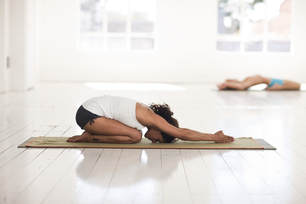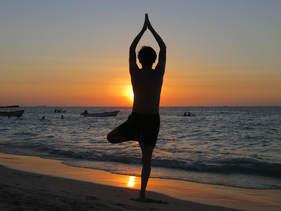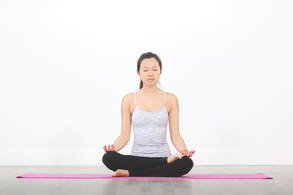
|
Email: tonileesmart@gmail.comtonileesmart@gmail.com
|
Useful links Yoga Australia
Health Fund Rebates Australian Yoga Journal Lively50Plus website Deepak Chopra Meditation website Kundalini Yoga - Healthy Happy Holy Orgaisation - 3HO Iyengar Yoga |
Frequently asked questions
What is yoga?
“The word yoga is related to the English word yoke. Yoga is the union of body mind and spirit – the union of your individuality with the divine intelligence that orchestrates the universe” - Deepak Chopra – The Seven Spiritual Laws of Yoga.
“Although it can be practiced religiously each day, yoga is not a religion. A more accurate description of yoga would be to say that it is an ancient science.”
- Shakta Kaur Khalsa – Kundalini Yoga
The Yoga Sutra 1.2 defines Yoga as the ability to direct the mind exclusively towards an object and sustain that direction without any distractions.
“Although it can be practiced religiously each day, yoga is not a religion. A more accurate description of yoga would be to say that it is an ancient science.”
- Shakta Kaur Khalsa – Kundalini Yoga
The Yoga Sutra 1.2 defines Yoga as the ability to direct the mind exclusively towards an object and sustain that direction without any distractions.
Where did Yoga originate?
Yoga is a central component of the comprehensive system of Indian philosophy known as Vedic science. The first books that referred to yoga were the ancient Tantras and later the Vedas.
What is Hatha Yoga?
Hatha Yoga is a branch of yoga that emphasises physical exercises to master the body along with mind.
What other types of yoga are there?
Ashtanga Yoga – This style is a vigorous style based on a six part series of asana practices that develop and increase in difficulty for the student.
Iyengar Yoga – named after its founder B.K.S Iyengar. It is a form of Hatha Yoga with an emphasis on details, alignment and precision of the yoga postures as well as controlling the breath.. Often props are used in the process.
VinYoga – The practice is designed to treat each student as an individual in incremental steps to assist them achieve their physical, mental and emotional goals.
Bikram yoga – students practice a series of 26 strict and demanding postures in rooms heated up to 40 degrees. It encourages sweating to flush out the bodies toxins.
Kundalini Yoga – Kundalini is the term for a spiritual energy or life force located at the base of the spine and is conceptualised as a coiled-up serpent. It includes Hatha Yoga postures that are performed with specific breathing techniques to raise complete body awareness to prepare the body, nervous system, and mind to handle the energy of Kundalini rising.
Iyengar Yoga – named after its founder B.K.S Iyengar. It is a form of Hatha Yoga with an emphasis on details, alignment and precision of the yoga postures as well as controlling the breath.. Often props are used in the process.
VinYoga – The practice is designed to treat each student as an individual in incremental steps to assist them achieve their physical, mental and emotional goals.
Bikram yoga – students practice a series of 26 strict and demanding postures in rooms heated up to 40 degrees. It encourages sweating to flush out the bodies toxins.
Kundalini Yoga – Kundalini is the term for a spiritual energy or life force located at the base of the spine and is conceptualised as a coiled-up serpent. It includes Hatha Yoga postures that are performed with specific breathing techniques to raise complete body awareness to prepare the body, nervous system, and mind to handle the energy of Kundalini rising.
What are the eight limbs or paths of the Yoga Sutras?
The eight limbs or paths of the Yoga Sutras are:
- Yama –discipline concerning our dealings with society and the world
- Niyama – personal discipline
- Asana – poses, postures
- Pranayama – regulated breathing techniques
- Pratyahra – withdrawal of the senses
- Dharna – the state of the mind in which the mind is oriented toward one point
- Dhyana – meditation
- Samadhi – identification with pure consciousness
What is the Bhagavad Gita?
The text was written to inform us that there is more to life than the everyday experience of our senses. It is a fictional tale between the Hindu God Krishna and Prince Arjuna. Prince Arjuna is filled with doubt on the battlefield. His enemies are his own relatives, beloved friends, and revered teachers. The prince turns to his charioteer and guide, God Incarnate Lord Krishna, for advice. Krishna responds to the prince’s confusion and moral dilemmas and explains to Arjuna his duties as a warrior and prince, elaborating on a variety of philosophical concepts.
What are the Upanishads?
The Upanishads are ancient Sanskrit texts that contain some of the central philosophical concepts and ideas of Hinduism. They played an important role in the development of spiritual ideas in ancient India.
Why meditate?
Meditation can help you reduce your stress and lower your blood pressure. It may help you improve your creative and critical thinking abilities. Some have found that it helps to increase energy levels and improve focus and concentration.
What is Yoga Nidra?
“Yoga Nidra, which is derived from the Tantras, is a powerful technique in which you learn to relax consciously. In yoga nidra, sleep is not regarded as relaxation. ... [It] is a systematic method of Inducing complete physical, mental and emotional relaxtion.”
- Swami Satyananda Sarawati – Yoga Nidra
- Swami Satyananda Sarawati – Yoga Nidra
Site Map |
Contact Me
Email: tonileesmart@gmail.com
|
Toni Smart Yoga acknowledges the Kabi Kabi people, the traditional custodians of the lands on which my yoga studio is located and where I conduct my business.
I pay my respects to ancestors and Elders, past and present.
Toni Smart Yoga is committed to honouring Australian Aboriginal and Torres Strait Islander peoples’ unique cultural and spiritual relationships to the land, waters and seas and their rich contribution to society.
I pay my respects to ancestors and Elders, past and present.
Toni Smart Yoga is committed to honouring Australian Aboriginal and Torres Strait Islander peoples’ unique cultural and spiritual relationships to the land, waters and seas and their rich contribution to society.



